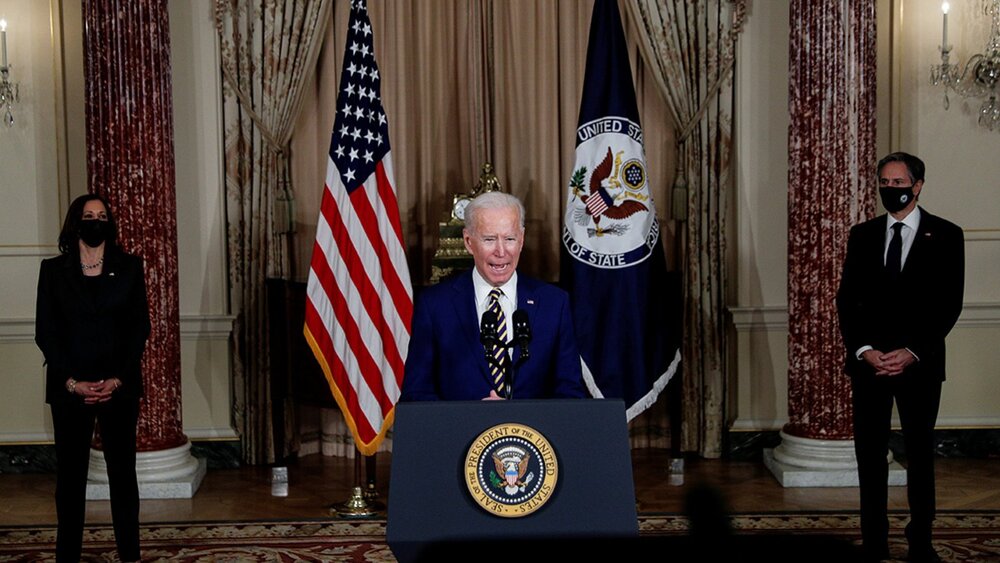Biden’s Iran policy is a variation of Bolton’s ‘Libya Model’: Responsible Statecraft

TEHRAN - Something is going very wrong with Joe Biden’s approach towards Iran. Unless he corrects the path, Biden risks losing a vital deal and putting the two nations back on a course towards war — at precisely the time he intends to focus on the multiple domestic crises facing America, according to Responsible Statecraft.
In his first month in office, Biden quickly reversed the most damaging of Donald Trump’s policies on climate, immigration, health care, and many others. But he has not changed Trump’s Iran policy. He has retained all of Trump’s sanctions and has not begun the diplomatic exchanges between the two nations that were usual during the last years of the Obama administration, the American publication writes.
Responsible Statecraft sharply criticized Biden’s administration for continuing Trump’s failed “maximum pressure” campaign, and noted, “Logically and legally, Biden should rejoin the agreement he helped craft, known as the Joint Comprehensive Plan of Action, or the JCPOA. The current crisis with Iran began when Trump pulled out of the multi-nation accord. Biden harshly criticized Trump’s action then, calling it a ‘manufactured crisis’ that made ‘the U.S., the region and our world less safe.’”
The American publication praised the recent measure taken by Biden’s diplomatic team towards Iran and writes, “Biden took the first tentative steps to resume diplomatic dialogue with Iran, agreeing to meet with the Europeans, China, Russia and Iran and to lift travel restrictions on Iranian diplomats at the United Nations in New York.”
Hailing Biden’s team due to their diplomatic skills, Responsible Statecraft stressed, “Starting with the president himself, through national security adviser Jake Sullivan, Secretary of State Antony Blinken, Iran Envoy Rob Malley, Deputy Secretary of State-designate Wendy Sherman, Under Secretary of Defense-designate Colin Kahl and more — is highly capable and deeply informed on Iran. They want to get both Iran and the United States back into compliance with the deal that shrank Iran’s nuclear program, froze it for a generation, and put it under the most rigorous inspection system ever negotiate.”
Pointing to the advantages of the JCPOA for U.S. national security, the American publication underscored, “Until Trump left in May 2018, Iran was in complete compliance with the agreement. Iran had removed over two-thirds of its operational centrifuges, exported all but a token amount of low-enriched uranium, drilled holes into the core of their plutonium reactor and filled it with concrete, and had put all their facilities under cameras, seals, and inspections.”
Meanwhile, it welcomes Iran’s compliance with the nuclear deal and noted, “Iran waited a full year after Trump violated the accord. Then, it took what it says are compensatory steps away from the agreement, but repeatedly insists it will immediately reverse those steps once the United States returns to compliance by lifting the Trump sanctions.”
The publication argues Biden’s approach on Iran is similar to Trump’s and writes, “During the presidential campaign, it seemed that Biden’s plan was to quickly rejoin the JCPOA, as he has quickly rejoined other critical arrangements Trump avoided. During the transition, he likely developed a plan to do so. But in the first month, he has made no progress, exchanging his original theory of “compliance for compliance” with the mantra that Iran must first come back into complete compliance before the United States moves. This is a variation of John Bolton’s “Libya Model.” The other side must do everything before the United States does anything.”
The Biden team may believe that this approach provides “leverage” and that it can use the so-called “sanctions wall” — erected by Trump’s hawkish advisers to block Biden’s return to the deal — as pressure to compel Iran to make concessions on its nuclear program or other issues. But, as Rebel Alliance Admiral Gial Ackbar from Star Wars warned, “It’s a trap.”
Leverage works two ways. Iran responded to each Trump move with its own moves and a dangerous cycle developed. On February 7, Iran’s Supreme Leader Ayatollah Ali Khamenei said that Tehran’s “final and irreversible” decision was to return to compliance only after the United States lifted sanctions. On February 23, Iran took another step away from the deal, implementing a law passed by Iran’s parliament that will reduce the access of IAEA inspectors to some of Iran’s facilities.
“Biden may believe that he will look weak if he moves first. His advisers are likely angered by Iran’s pressure tactics. They are also under pressure from some donors and conservatives in the Democratic Party, such as hawkish Senate Foreign Relations Committee Chairman Robert Menendez, to punish Iran,” the publication says.
“The only certain path away from war is through a quick return to the agreement that prevented one,” Responsible Statecraft asserted.
Pointing to a recent Washington Post survey, Responsible Statecraft highlighted the majority of West Asia specialists insist the U.S. needs to rejoin the nuclear deal as soon as possible and noted, “75 percent of Middle East (West Asia) experts polled said that returning to the JCPOA would make it less likely that Iran would get a nuclear bomb in the next decade — about as certain a prediction as is possible in global security. Only 2 percent said that returning would make it more likely. Sixty-seven percent said that returning immediately to the deal before addressing other issues would serve U.S. national security interests. Only 23 percent wanted to go for a ‘grand bargain’ instead.”
“The greatest danger of Donald Trump’s Iran policy was that the two sides would stumble into a war that neither government wanted. Now the greatest danger of Joe Biden’s policy is that the two sides could fumble away a deal that both governments actually want,” Responsible Statecraft argues.
EE/PA
